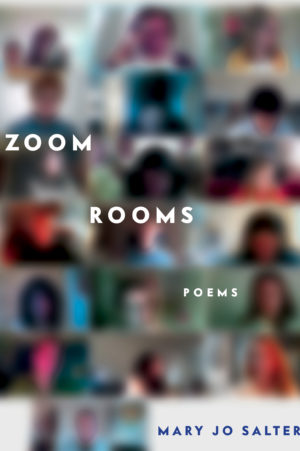Zoom Rooms
by Mary Jo Salter
reviewed by Jeffrey Careyva
As we enter a third COVID summer, Mary Jo Salter’s newest poetry collection takes us back to the uncanny confines of social distancing and Zoom meetings that characterized the pandemic’s first phases. Zoom Rooms explores the shrinking of social life into the now-familiar pixelated windows of Zoom, but beyond Gallery and Speaker View, Salter’s poems draw on a wealth of artworks and objects to trace the contours of bittersweet memories.
The titular section of Zoom Rooms consists of a sequence of seven sonnets, which together paint a disquieting picture of virtual meeting spaces. In these poems Salter takes the sonnet form apart and puts it back together again, blending Shakespearean and Petrarchan rhyme schemes and riffing on Zoom’s eccentric and unsatisfactory vocabulary:
Followers and Friends and Participants,
Gallery View, which Speaker View supplants,
Meeting Attendants, who for now are Mute
or worse, Unmute, a word I might dispute
even exists, whether verb or adjective:
Is this life? Is this how you want to live?
The internal rhyming of this techno-dystopian lingo (e.g. “Participants” and “Attendants,” “Mute” and “Unmute”) is but one flourish among many, as Salter uses one culturally iconic form—the sonnet—to critique another—the Zoom “Room.” Sonneteers like Shakespeare and Edna St. Vincent Millay are famed for their ability to compress complex emotions and love triangles into fourteen-line boxes. Salter expertly, and perhaps ironically, employs the sonnet form to illustrate how much Zoom already compresses social experience.
As much as these poems express dismay at the technology mediating our most intimate interactions, Salter also brings a wry sense of humor to this absurd state of affairs. I never expected to encounter a meme phrase like “OK, Boomer” in a sonnet, but from the beginning of this collection Salter is well aware that even poets share the common fate of becoming outmoded and forgotten.
The title of Salter’s opening poem, “Your Session Has Expired,” conveys from the get-go this feeling of lagging behind in the digital rat race. The terse and teasing tone of lines like “Too bad. You can’t reboot. / In fact, the very terms / you use will soon be moot” reckons with pending oblivion without resorting to cynicism. In poems from later in the collection, such as “Last Words” and “Forgetting Names,” Salter vacillates between sharing wry insights and airing her frustrations, between cherishing what remains and preparing for the losses she already sees coming.
In addition to the frailty of all things, Salters contends with the very limits of memory in poems inspired by eclectic artworks and objects. In “Hot Water Bottle,” for example, an old-fashioned source of heat serves as an overdetermined relic of a mother’s care:
But today for some
reason, or none—
which happens more and more often—
you resurfaced, like those
secret stabs in the gut
I’d have to endure at school.
I always forgot how bad it was
until another month had passed.
I always forgot I’d need you again
to soothe me, home from the wars at last,
with a cup of tea and the vaguely
vulva-like red rubber
hot water bottle.
Later lines like “Somebody left on earth should know / that when I was young / you doted on me” offer a gut-punch of their own as they attempt the bittersweet work of poetic immortalization.
This is all to say that, despite the specificity of the collection’s title, Salter’s interests extend far beyond the computer screen. She looks to paintings, old photos imbued with confabulated memories, and even a hot iron resembling a cruise ship on the open sea, for inspiration. Her ekphrastic poems range from the luscious work of Carlo Crivelli to the pinnacle of an altarpiece painted by Giotto di Bondone, from a diptych of John Singer Sargent’s domestic paintings to a dozen ovular haikus inspired by William Bailey’s Eggs.
Careful observations in these poems morph into sobering reflections; the bizarre details of a Renaissance painting like Saint Sebastian Interceding for the Plague Stricken become unsettlingly relevant to today’s plague. Salter’s formalist and ekphrastic poetics never feels heavy-handed or tired, and the longer poems, with their elaborate allusions, enjoy an easy loquacity. “Island Diaries,” for example, stages a dreamlike desert-island scenario (featuring Defoe’s Robinson Crusoe and the cast of The Tempest) that offers up surprises even as it recalls literary classics.
Salter’s blend of remembrance and observation culminates in her final poem, a love letter to her infant granddaughter born in the age of coronavirus. Here, Salter compels herself to remember her granddaughter’s first months while maintaining a worried optimism. Amid contemporary crises, Salter’s fear of futility reappears: “Yet I hardly tried at all / to make this old world better; // what I made was dinner / and poems, when I could.” Nonetheless, Zoom Rooms offers more than enough wit, craft, and emotional intensity to leave a lasting memory.
Published on May 31, 2022

